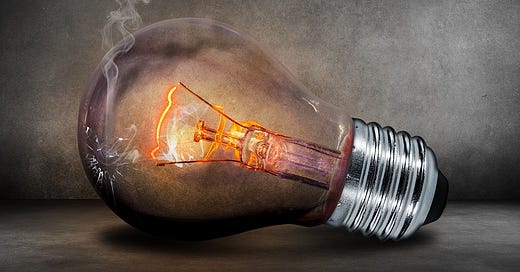September has fallen, and fall has come. In the part of the world where I’m living, that means colder days and longer nights. The energy crisis makes turning up the heat pretty costly. Fortunately, our brains are furnaces that burn up to 20% of our body’s energy. Here’s some kindle for that internal fire.
Science
Climate Endgame. Most climate change science focuses on mitigation and on trying to move the needle closer to best-case (let’s be honest, least-worse-case) scenarios. This paper does the opposite by asking ‘how bad can it get?’ Very, very bad. The authors make great points about tipping points (second homonym of the day. I’m on a roll) and feedback loops. They come to the sobering conclusion that even ‘modest’ levels of global warming could be pretty bleak…
In the context of climate change, spare two minutes to check out this powerful speech by Colombia’s president as he addressed the UN:

'Cause baby, you're a firework. Humans like to shoot things, it seems. So, of course, NASA couldn’t stay behind. To test a method of asteroid deflection, the agency steered a spacecraft into the small asteroid Dimorphos on September 26th. The result was cosmic fireworks.

My, what big teeth you have, great-great-great… 99% of all living vertebrates have jaws. In other words, in our vertebrate strand in the web of life, evolving jaws was a big deal. Molecular dating suggests this happened around 450 million years ago. So far, the earliest jawed fossils are 425 million years old. But, new ones from China (including one with teeth) now push this back to 439 million years. Noms.
Slowing Alzheimer’s disease. Eisai and Biogen report a phase 3 trial of their amyloid antibody lecanemab that showed a 27% decline in disease progression. As the Alzheimer’s Association notes it is far from a cure and we:
…must redouble efforts to discover new targets and test new and more effective treatments for Alzheimer’s and all other dementia.
But every effort that can help patients live full, independent lives for longer is a win.
Technology
Beyond the deep? Deep learning is all the rage right now. This type of machine learning is based on artificial neural networks with several layers. Hence deep. Deep learning has given us impressive tools like GPT-3 and DALL-E. Yet, we’re starting to realize that this is not enough to end up with a truly ‘smart’ system. This short feature has a few cool examples of how researchers are trying to add sleep-wake cycles or slow and fast thinking to machine learning systems to make them more robustly ‘intelligent’.
How deep? To stay on topic, deep learning is often opaque. That is, we don’t always know what happens in the subsurface layers. How do different layers make ‘decisions’? What are the features they pay attention to? In this paper, a group of researchers proposes a taxonomy of interpretable AI that gives developers the terms and tools to make AI interpretable, explainable, and transparent.
Philosophy
Intelligence, I think. Here are two excellent, somewhat longer pieces on intelligence. The first one asks then questions about the limits of human intelligence. The second one is an absolute beauty that asks us to rethink non-human intelligence. It goes from crows and octopuses to AI to Wittgenstein and - I rejoice - the importance of storytelling. I could just quote the whole thing, but that would be overkill. Here’s a good one:
Within our own human experience of intelligence, we have to get beyond the rational. We have to explore the possibilities of involving emotion and embodiment in our models of artificial learning. Studies of emotion in AI currently focus on the computer’s capacity to produce emotion in the human user — not on the existence of emotion in the machine. But is that the limit of what can be imagined or achieved?
The good life, digital version. Can the ancient Greek Epicurists help us live the good life in the digital age? This article makes the case for ‘yes’.
I reason that I can live a good life, even if a lot of it is spent on my computer – so long as I regulate my inputs and outputs conscientiously, the same way I would for any other physical process, like eating or exercise. You are what you eat, and, in a different but fundamentally related sense, you are what you scroll through, watch, comment on and download. It's all matter, and matter matters.





